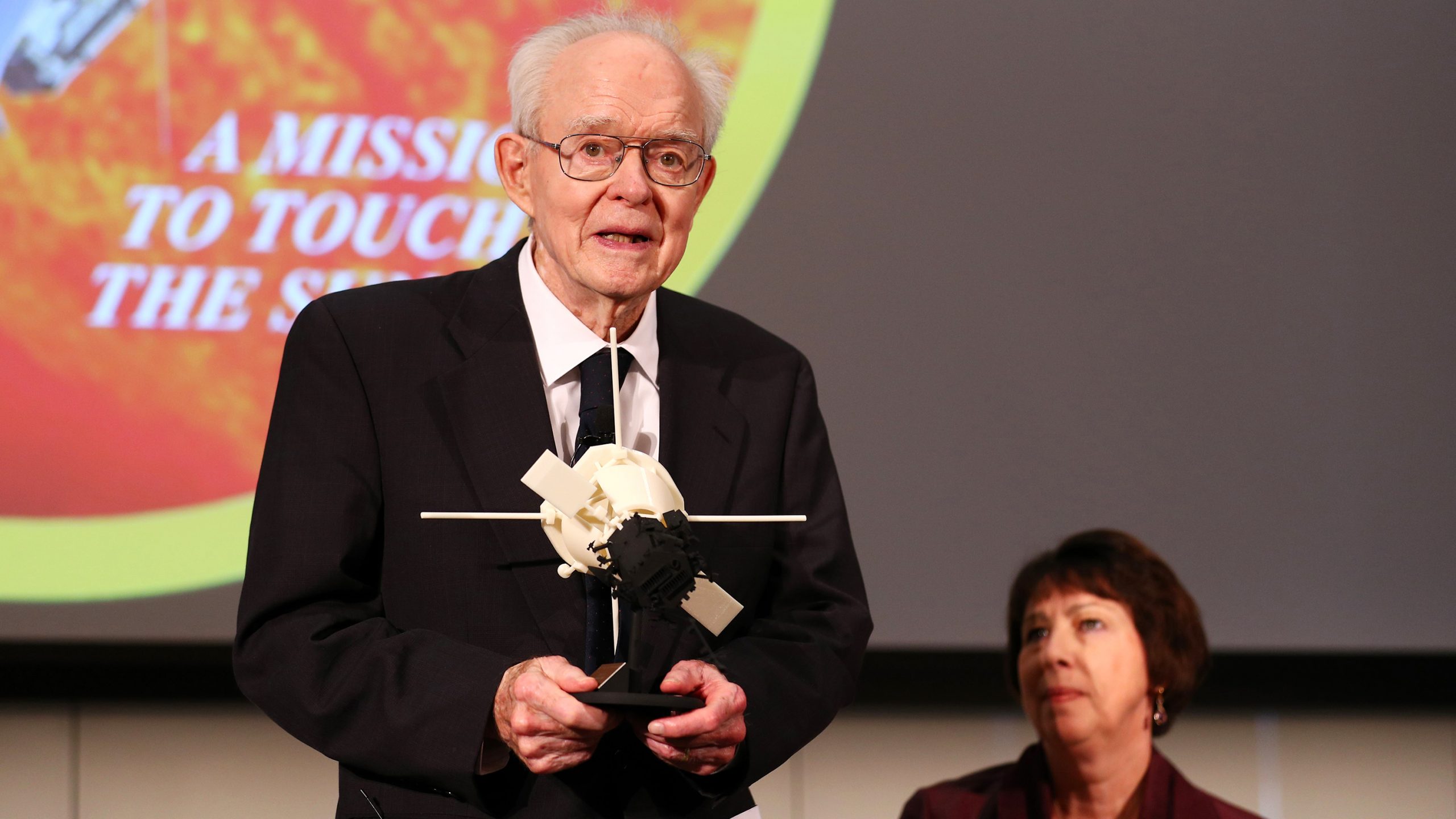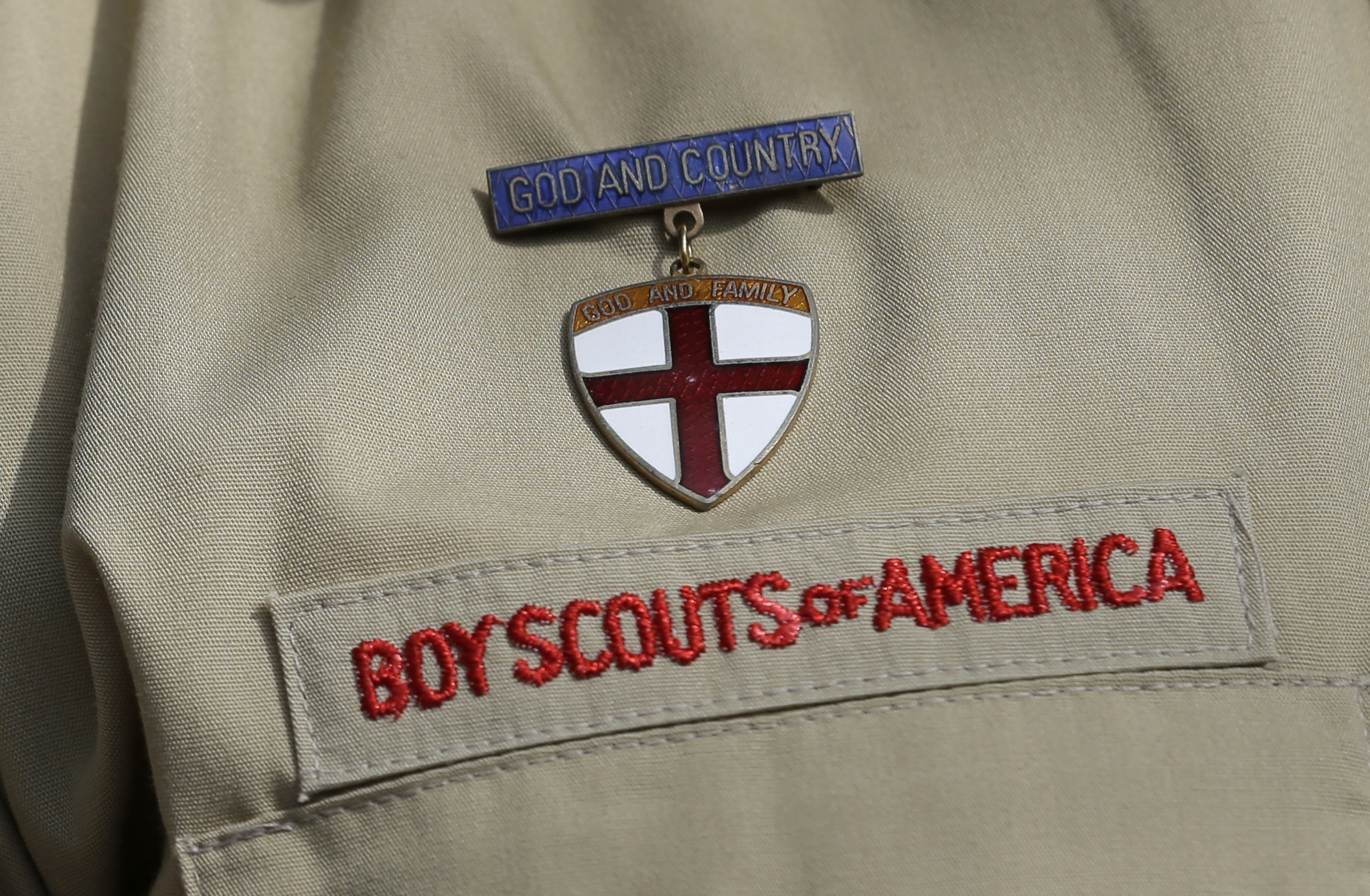Astrophysicist Eugene Parker, pioneer behind ‘mission to touch the sun’ dead at 94
Mar 16, 2022, 5:34 PM | Updated: Jun 8, 2022, 3:17 pm

CHICAGO, USA - MAY 31: Astrophysicist Dr. Eugene Parker from University of Chicago speaks after receiving the public service medal and the model of Parker Solar Probe during a meeting at William Eckhardt Research Center in Chicago, United States on May 31, 2017. National Aeronautics and Space Administration (NASA) announced the planning to launch the first mission to fly directly into the sun's atmosphere for the first time, with the 'Parker Solar Probe' in the summer of 2018. (Photo by Bilgin S. Sasmaz/Anadolu Agency/Getty Images)
(Photo by Bilgin S. Sasmaz/Anadolu Agency/Getty Images)
(CNN) — Eugene Parker, an astrophysicist who pioneered the solar research field of heliophysics, has died at age 94.
Parker died Tuesday, according to the University of Chicago, where he joined the faculty in 1955 and eventually became the S. Chandrasekhar Distinguished Service Professor Emeritus.
Parker’s work revolutionized human understanding of the sun and interplanetary space. In 1958, he proposed the concept of solar wind after realizing the sun had a magnetic field that created a structure in our solar system, populated by plasma and hot particles. He realized that this stream was a flow of gas.
“It hit me that it’s a solar wind,” Parker told CNN in 2018.
Eugene Parker’s work revolutionized our understanding of the universe and gave humanity the ability to ‘touch the Sun.’ He will be deeply missed. #ParkerSolarProbe pic.twitter.com/YgBUxtXQpw
— NASA Sun & Space (@NASASun) March 16, 2022
“We were saddened to learn the news that one of the great scientific minds and leaders of our time has passed,” said NASA Administrator Bill Nelson in a statement. “Dr. Eugene Parker’s contributions to science and to understanding how our universe works touches so much of what we do here at NASA. Dr. Parker’s legacy will live on through the many active and future NASA missions that build upon his work.”
On August 12, 2018, the Parker Solar Probe launched from Florida on a seven-year mission to unlock the mysteries of the sun. It was named in honor of Parker’s pioneering work that established heliophysics in the 1950s. This made Parker the first living person to have a spacecraft named after him, and he was present in Cape Canaveral for the launch.
The journey to make the mission possible took 60 years. On board the craft is a chip carrying photos of Parker, his groundbreaking 1958 paper on solar wind and more than 1.1 million names submitted by the public.
The chip is attached to a card that reads, “The Parker Solar Probe mission is dedicated to Dr. Eugene N. Parker whose profound contributions have revolutionized our understanding of the sun and solar wind. ‘Let’s see what lies ahead.’ Gene Parker, July 2017.”
“The field of heliophysics exists in large part because of Dr. Eugene Parker,” said Thomas Zurbuchen, NASA’s associate administrator for science, in a statement. “Honoring his work by giving Parker Solar Probe his name is one of the proudest accomplishments of my career. My work, my passion for science, and my drive to keep exploring is strongly influenced by this great man. Parker Solar Probe ‘touching the Sun,’ is a fitting accomplishment for his namesake mission.”
We are saddened by the loss of Eugene Parker, for whom our #ParkerSolarProbe is named. His work deepened our understanding of the universe, inspires and enables new missions.
We stand on the shoulders of giants. Dr. Parker helped us touch the Sun. https://t.co/W2ExBfKMzO pic.twitter.com/p3YgR9FNvg
— NASA (@NASA) March 16, 2022
Solar wind is not the only thing credited to Parker. He worked out the dynamics of cosmic rays in the galaxy alongside a few other colleagues, and he discovered the Parker Spiral (the shape of the wind from the sun) and the Parker limit for monopoles, which is about the survival of galactic magnetic fields that places a limit on the flux of magnetic monopoles (the magnetic version of charged particles) in the universe.
Parker retired from the University of Chicago in 1995, but remained an active researcher as he continued to publish articles and books. He served as chair of the university’s department of astronomy and astrophysics twice and also served as chair of the National Academy of Sciences’ astronomy section.
Over the course of his lifetime, Parker received the U.S. National Medal of Science, the Kyoto Prize, the Crafoord Prize, the American Physical Society Medal for Exceptional Achievement in Research and its James Clerk Maxwell Prize. He was a fellow of the American Physical Society and a Legacy Fellow of the American Astronomical Society.
Triste noticia, la muerte de Eugene Parker. Sus aportes al entendimiento de la física del Sol son monumentales. Se fue sin su merecido Premio Nobel de Física. pic.twitter.com/t4LW53vQK6
— Santiago Vargas (@astrosvd) March 16, 2022
“We are devastated by the loss of my father, but we know his legacy spans not only our family and friends, but the international community of scientists around the globe,” said his son Eric Parker in a statement.
“We extend our gratitude to everyone who has reached out with memories, for his colleagues over the years who worked with him to explore a subject which gave him much joy, and for the many people at NASA and the Applied Physics Laboratory who welcomed my father and gave him a profound gift — the chance to see the launch of the Parker Solar Probe, which moved him deeply.”
A voyage of curiosity
As a child, Parker lived in Buffalo, New York, two blocks from a railroad yard. The trains fascinated him. His father, an aeronautical engineer at the Consolidated Aircraft Company, would explain things in a way he could understand.
Parker did experiments with “tin can” telephones to learn how sound traveled. He inherited a microscope from his grandfather and studied microorganisms. The wonders of the world never ceased for him.
But school was a different story, and Parker said he was “not an enthusiastic student” — at least until high school, when he was introduced to algebra, Euclidean geometry and trigonometry. Their simplistic principles, he said, piqued his interest in a way biology or social studies did not.
And in his senior year, he was introduced to physics. Parker had the epiphany that physics was the basis for all of his interests over the years, and he quickly realized that he wanted to become a physicist like his grandfather and an uncle, who both worked at Bell Laboratories.
Parker pursued a bachelor’s degree in physics at Michigan State University and then received his doctorate from the California Institute of Technology in 1951. He began his teaching career at the University of Utah before joining the faculty at the University of Chicago and its Enrico Fermi Institute.
Discovering solar wind
Parker wasn’t viewed as a pioneer in 1958. Instead, he battled the old guard for his new ideas to be accepted.
Eugene Parker, the solar physicist for whom NASA’s Parker Solar Probe is named, passed away March 15 at the age of 94. https://t.co/D2SG9SVQxD
— Jeff Foust (@jeff_foust) March 16, 2022
The then-30-year-old submitted a paper to the Astrophysical Journal for review before publication. In it, he proposed the concept of solar wind.
A flow of charged gases from the sun, solar wind is present in most of the solar system. It screams past Earth at a million miles per hour, and can cause disruptive space weather that impacts our planet.
The mathematics to predict solar wind were simple: four lines of algebra.
But the two esteemed referees reviewing his paper rejected Parker’s “radical” idea. There were no errors in his study or his math. The concept, however, conflicted with astronomers belief at the time that the space between planets was a vacuum.
Parker went to the editor of the journal, Subrahmanyan Chandrasekhar, an astrophysicist who would be awarded the 1983 Nobel Prize for Physics. Chandrasekhar overruled the referees and agreed to publish the paper.
“Many of his colleagues thought he must be wrong, but when (the probe) Mariner 2 was on the trip to Venus in 1962, it revealed that a supersonic wind was always present,” said Ed Stone, longtime project scientist for NASA’s Voyager mission, who worked across the hall from Parker at the University of Chicago.
A lasting legacy
Parker was humble when he reflected on his legacy — perhaps because he was surrounded by pioneers of astronomy and astrophysics in the 1950s and 1960s, during the Space Age.
He was contemporaries with Nobel laureates Chandrasekhar, Enrico Fermi and Arthur Holly Compton. All of these former University of Chicago professors have posthumously had spacecraft named for them, including the Chandra X-ray Observatory, the Fermi Gamma-Ray Telescope and the Compton Gamma Ray Observatory.
“The University and the department has lost one of its giants,” said Michael Turner, the Bruce V. and Diana M. Rauner Distinguished Service Professor Emeritus of Astronomy and Astrophysics at the University of Chicago, in a statement.
“Gene changed the course of science with his work on magnetic fields literally everywhere in the cosmos, but he remained humble and approachable, with a wry sense of humor. He ranked up there with Stephen Hawking in his ability to express the gist of an issue, scientific or otherwise, in a few clear sentences.”
Next month, Parker’s family will travel to Sweden to a ceremony celebrating the Crafoord Prize, which he won in 2020.
“Anyone who knew Dr. Parker, knew that he was a visionary,” said Nicola Fox, director of the Heliophysics Division at NASA Headquarters in Washington.
“I was honored to stand with him at the launch of Parker Solar Probe and have loved getting to share with him all the exciting science results, seeing his face light up with every new image and data plot I showed him. I will sincerely miss his excitement and love for Parker Solar Probe. Even though Dr. Parker is no longer with us, his discoveries and legacy will live forever.”
The-CNN-Wire™ & © 2022 Cable News Network, Inc., a WarnerMedia Company. All rights reserved.













